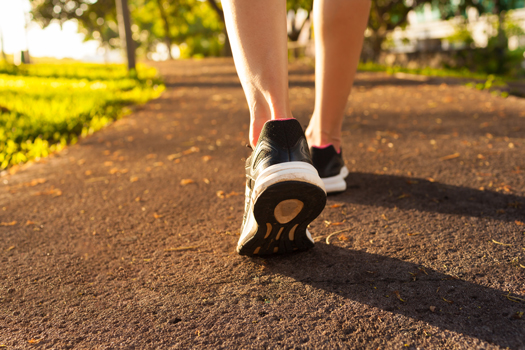
When you have pain related to a damaged or herniated disc (sometimes referred to as a “slipped disc” or ”ruptured disc”), even walking can be difficult or uncomfortable. The good news is if a discectomy is right for your spinal condition, it's typical to be able to get back to your preferred level of activity with little or no discomfort once you’ve recovered. As for how soon you can walk after having part or all of a spinal disc removed, we answer this question below based on what's commonly recommended.
Short Walks Can Start Soon after Surgery
According to Spine Health, it's typical for patients recovering from microdiscectomies to be advised to take brief walks as soon as possible shortly after surgery. If you have a minimally invasive procedure, you may be able to safely take short walks around the house on the same day of your procedure or the first full day after if you're still a bit tired or groggy. When walking shortly after surgery, take the following precautions:
• Stay on flat, firm surfaces
• Use a cane or walker for support if you feel a bit unsteady
• Wear skid-resistant socks or slippers
Prepare Your Home for Walking after Your Discectomy
Climbing stairs is best avoided at least for the first week or so after a microdiscectomy to minimize strain on your healing spine. At the same time, it's typical to also be encouraged to move and walk as much as possible to strengthen the muscles that support your spine and increase circulation. A good way to achieve this goal safely is to prepare your home before you have your discectomy so everything is ready when you return. Recommendations for this purpose include:
• Setting up a temporary sleeping area downstairs
• Removing any potential obstructions, such as furniture that may be awkwardly placed
• Securing or removing loose rugs to make walking safer
Gradually Step Up Your Walking & Activity Level
A few weeks after your microdiscectomy, you’re likely to be experiencing much less pain and an increased ability to safely and effectively move around. At this point, you should be able to safely walk at a faster pace or in outdoor locations, such as a nearby park. As long as you have your doctor’s approval, you should also be able incorporate light physical activity back into your routine once you get a few weeks past your surgery. However, it's also important to avoid certain movements and activities as you step up your pace with walking and other lighter forms of exercise. These include:
• Heavy lifting
• Repetitive motions that involve bending, twisting, or excessive reaching
• Strenuous forms of exercise
• Contact sports
Combine Walking with Gentle Stretches
As your recovery from your discectomy progresses, it can be helpful to combine walking with gentle stretching. What this does is help tissues heal while improving the ability of your soft tissues to support your healing spine. You'll likely be referred to a physical therapist after your surgery. The therapist should be able to help you find an appropriate mix of stretching and gentle lower back pain exercises to go along with regular walking and movement.
Even though microdiscectomy surgery is a common and generally quite successful procedure, a hole is frequently left in the outer wall of the disc. In fact, 70 percent of all reherniations come from large holes in the disc. These reherniations often require additional surgery or even fusions. Fortunately, there’s a new treatment specifically designed to close the large holes that are often left in spinal discs after discectomy surgery. Barricaid is a bone-anchored device proven to reduce reherniations, and 95 percent of Barricaid patients didn’t undergo a reoperation due to reherniation in a 2-year study timeframe. This treatment is done immediately following the microdiscectomy—during the same operation—and doesn’t require any additional incisions or time in the hospital.
If you have any questions about the Barricaid treatment or how to get access to Barricaid, ask your doctor or contact us at 844-288-7474.
For full benefit/risk information, please visit: https://www.barricaid.com/instructions.


Comments